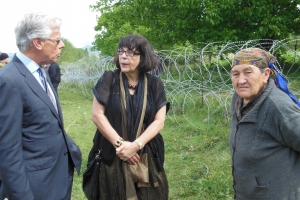OSCE High Commissioner on National Minorities visits Georgia, discusses integration, expresses concern over developments along the administrative boundary line
The OSCE High Commissioner on National Minorities (HCNM) Knut Vollebaek visited Georgia from 19 to 20 June 2013.

L-r: OSCE High Commissioner on National Minorities Knut Vollebaek, speaking with an interpreter and a local resident at Khurvaleti village by the administrative boundary line with South Ossetia, 20 July 2013.
In his meetings with authorities in Tbilisi, the High Commissioner discussed the situation for minorities in the field of education, with a particular focus on the multilingual education programme.
He also discussed the ongoing process to repatriate the Meskhetian population that was deported from Georgia by the Stalinist regime in the 1940s. Vollebaek urged the authorities to give priority to this process in order to comply with Georgia’s international commitments.
In Tbilisi, the High Commissioner also chaired a roundtable meeting on the Ljubljana Guidelines on Integration of Diverse Societies.
“Integration is an important topic in Georgia, as the choices made in this field have significant consequences for the future of your country,” Vollebaek said, addressing the event participants.
“Integration policies can be an effective tool for conflict prevention, but this complex and comprehensive concept represents a great challenge for policy makers and must be handled with care,” Vollebaek said. “My Institution will remain at the disposal of the Georgian government to provide advice, opinions and ideas in the process.”
During his visit the High Commissioner Vollebaek met with the President of Georgia Mikheil Saakashvili, Prime Minister Bidzina Ivanishvili, Foreign Minister Maia Panjikidze, Education Minister Giorgi Margvelashvili, Internal Affairs Minister Irakli Garibashvili, Reintegration Minister Paata Zakareishvili and other state officials, as well as representatives of the diplomatic corps and civil society.
The OSCE High Commissioner also visited the villages of Khurvaleti and Ditsi, situated on the administrative boundary line (ABL) with the territory of South Ossetia, to talk to local residents on both sides of the recently erected fence about its impact on the free movement of people across the line. He took note of the local people’s deep dissatisfaction with the fence. Vollebaek expressed his concern regarding the development the ABL which he said caused additional burden for the local population, threatened their livelihoods and had a potential for aggravating the already tense situation in the area.
“I call upon relevant authorities to immediately halt the construction of fences and instead focus their efforts on addressing humanitarian problems facing local populations on both sides of the administrative boundary line,” Vollebaek said.
Source: Organization for Security and Co-operation in Europe
- 507 reads
Human Rights
Fostering a More Humane World: The 28th Eurasian Economic Summi

Conscience, Hope, and Action: Keys to Global Peace and Sustainability

Ringing FOWPAL’s Peace Bell for the World:Nobel Peace Prize Laureates’ Visions and Actions

Protecting the World’s Cultural Diversity for a Sustainable Future

Puppet Show I International Friendship Day 2020

